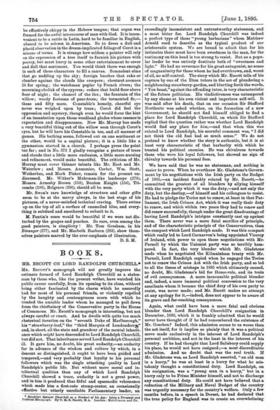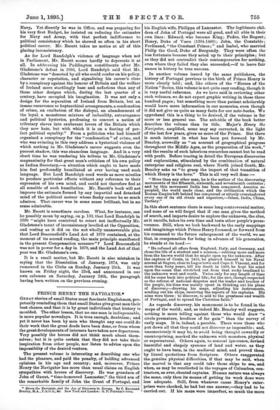BOOKS.
MR. ESCOTT ON LORD RANDOLPH CHURCHILL.*
MR. ESCOTT'S monograph will not greatly improve the estimate formed of Lord Randolph Churchill as a states. man by those who, like the present writer, have watched his public career carefully, from its opening to its close, without being either fascinated by the charm which he assuredly had for most of his personal friends, or violently repelled by the haughty and contemptuous scorn with which he treated the amiable leader whom he managed to pull down from the chieftaincy of the Conservative party in the House of Commons. Mr. Escott's monograph is interesting, but not always careful or exact. And he dwells with quite too much rhetorical iteration on the "seventh Duke of Marlborough," his " strawberry-leaf," the "third Marquis of Londonderry*" and, in short, all the state and grandeur of the mental inherit- ance which might have descended to Lord Randolph Churchill, but did not. That inheritance served Lord Randolph Churchill ill. It gave him, no doubt, his great audacity,—an audacity far in advance of the wisdom and culture by which, in a descent so distinguished, it ought to have been guided and tempered,—and very probably that loyalty to his personal followers which was the single attaching quality in Lord Randolph's public life. But without more moral and in- tellectual qualities than any of which Lord Randolph Churchill showed a trace, audacity is not a great power, and in him it produced that fitful and spasmodic vehemence which made him a first-rate stump-orator, an occasionally effective but utterly unreliable Parliamentary leader, an • Randolph Spencer Churchill as a Product of hie Age: being a Personal and Monolpaph. By T. H. B. Recott, M.A. London: Hutchinson and Co. exceedingly inconsistent and untrustworthy statesman, and a most bitter foe. Lord Randolph Churchill was indeed a perfect type of those "young barbarians" whom Matthew Arnold used to describe as the typical product of our aristocratic system. We are bound to admit that for his intimates there must have been sweetness in the man, for the testimony on this head is too strong to resist. But as a popu- lar leader he was entirely destitute both of "sweetness and light." He had no reverence for his great antagonist, no sense of magnanimity for those whom he had overthrown, and, worst of all, no self-control. The story which Mr. Escott tells of his capture by one of the Eton tutors in the act of plundering a neighbouring strawberry-garden, and blurting forth the words, " You beast," against the offending tutor, is very characteristic of the future politician. His vindictiveness was untempered by any shame at his own violent and imperious self-will. It was said after his death, that on one occasion Sir Stafford Northcote was asked whether, on the formation of a new Government, he should not find himself obliged to find a place for Lord Randolph Churchill, on which Sir Stafford replied that the question rather was whether Lord Randolph would find any place for him,—and that when this was related to Lord Randolph, his scornful comment was, " I did not think the old fool had so much sense." We do not pretend to know whether the story is authentic, but it is at least very characteristic of that barbarity with which he treated his political enemies. He was chivalrous towards those who were his loyal followers, but showed no sign of chivalry towards his personal foes.
We have said that he was no statesman, and nothing is easier to prove. When he overthrew Mr. Gladstone's Govern- ment by his negotiations with the Irish party on the Budget of 1885,—an incident frankly related by Mr. Escott,—be committed the greatest of all blunders by allying himself with the very party which it was the duty,—and not only the duty, but the destiny,—of himself and his colleagues to resist. He had to pledge the Tories not to renew, at least in that Par- liament, the Irish Crimes Act, which it was really their duty to renew, and which within two years they had to renew and did renew successfully, though under the great disadvantage of having Lord Randolph's intrigue constantly cast up against them. There never was a more fatal sacrifice of principle, and of the characteristic principle of the Conservatives, than the compact which Lord Randolph made. It was this compact which really led to Lord Carnarvon's being appointed Viceroy of Ireland, with power to open those negotiations with Mr. Parnell by which the Unionist party was so terribly ham- pered. In fact, the very blunder which Mr. Gladstone made when he negotiated the Kilmainham treaty with Mr. Parnell, Lord Randolph copied when he engaged the Tories not to renew the Crimes Act with the Irish party, and so led to all the tissue of mishaps in 1885 which ultimately caused, no doubt, Mr. Gladstone's bid for Home-role, and its train of evil consequences. A more inexcusable political blunder and, indeed, a more immoral political concession to the very assailants whom it became the chief duty of his own party to resist, was never made; and Mr. Escott makes no attempt at any apology for it,—indeed, does not appear to be aware of its grave and far-reaching consequences.
Again, what could have been a more fatal and obvious blunder than Lord Randolph Churchill's resignation in December, 1886, which it is frankly admitted that he would never have thought of if he had remembered the existence of Mr. Goschen ? Indeed, this admission seems to us worse than the act itself, for it implies so plainly that it was a political move made exclusively in the interest of Lord Randolph's personal ambition, and not in the least in the interest of his country. If he had thought that Lord Salisbury could supply his place, he would not have resigned ;—a most discreditable admission. And no doubt that was the real truth. If Mr. Gladstone was, as Lord Randolph asserted, "an old man in a hurry," he was at least in a hurry for what he mis- takenly thought a constitutional duty. Lord Randolph, on his resignation, was a "young man in a hurry," but in a hurry only to be Prime Minister himself, and not to discharge any constitutional duty. He could not have believed that a reduction of the Military and Naval Budget of the country was urgently necessary for the country's welfare. Only a few months before, in a speech in Dorset, he had declared that the true policy for England was to create an overwhelming Navy. Yet directly he was in Office, and was preparing for his very first Budget, he insisted on reducing the estimates for Navy and Army, with that perfect indifference to political consistency which he showed so often in his short political career. Mr. Escott takes no notice at all of this glaring inconsistency.
As for Lord Randolph's violence of language when not in Parliament, Mr. Escott seems hardly to deprecate it at all. In addressing his Paddington constituents after Mr. Gladstone's defeat in 1886, Lord Randolph said that Mr. Gladstone was " deserted by all who could confer on his policy, character or reputation, and signalising his career's close by a conspiracy against the honour of Britain and the welfare of Ireland more startlingly base and nefarious than any of those other designs which, during the last quarter of a century, have occupied his imagination. It was not only a design for the separation of Ireland from Britain, but an insane recurrence to heptarchical arrangements, a condonation of crime, an exaltation of the disloyal, an abandonment of the loyal, a monstrous mixture of imbecility, extravagance and political hysterics, professing to convert a nation of tributary slaves into exuberant lovers of the Britain which they now hate, but with which it is on a footing of per- fect political equality." From a politician who had himself organised a conspiracy for the " condonation " of crime, and who was evincing in this very address a hysterical violence of which nothing in Mr. Gladstone's career suggests even the poorest shadow, this was shameless language. And in a very short time he was rendering his tribute to Mr. Gladstone's magnanimity for that great man's criticism of his own policy as Indian Secretary,—a situation which ought to have made him feel profoundly humiliated at ever having used such language. But Lord Randolph used words as mere missiles to produce particular effects without any reference to their expression of his own mind, and could not therefore feel at all sensible of such humiliation. Mr. Escott's book will not improve the estimate formed by any impartial and detached mind of the political meteor whose flashy career he so much admires. That career was in some sense brilliant, but in no sense admirable.
Mr. Escott is sometimes careless. What, for instance, can he possibly mean by saying, on p. 133, that Lord Randolph in 1880 " might have contrived to retort not ineffectually Mr. Gladstone's taunt of inconsistency levelled at the Opposition, and resting as it did on the not wholly unanswerable plea that Lord Beaconsfield's Land Act of 1870 contained, at the moment of its second reading, the main principle manifested in the present Compensation measure"? Lord Beaconsfield was not in power for a day in 1870, and the Land Act of that year was Mr. Gladstone's own.
It is a small matter, but Mr. Escott is also mistaken in saying that the Dissolution of January, 1874, was only rumoured in the Clubs on Sunday, January 25th. It was known on Friday night, the 23rd, and announced in our own columns on Saturday, January 24th, the paragraph having been written on the previous evening.







































 Previous page
Previous page